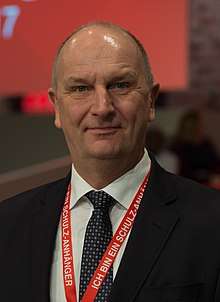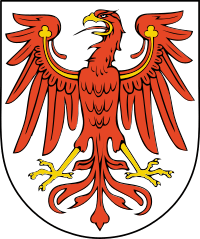Dietmar Woidke
Dietmar Woidke (born 22 October 1961) is a German politician of the Social Democratic Party of Germany. Since August 2013, Woidke has served as Minister President of Brandenburg.[1] He is married.
Dietmar Woidke | |
|---|---|
 Woidke in 2017 | |
| Minister President of Brandenburg | |
| Assumed office 28 August 2013 | |
| Deputy | Helmuth Markov Christian Görke Ursula Nonnemacher Michael Stübgen |
| Preceded by | Matthias Platzeck |
| President of the Bundesrat | |
| Assumed office 1 November 2019 | |
| First Vice President | Daniel Günther |
| Preceded by | Daniel Günther |
| Leader of the Social Democratic Party in Brandenburg | |
| Assumed office 26 August 2013 | |
| General Secretary | Klaus Ness Klara Geywitz Erik Stohn |
| Preceded by | Matthias Platzeck |
| Minister of the Interior of Brandenburg | |
| In office 23 September 2010 – 28 August 2013 | |
| Minister President | Matthias Platzeck |
| Preceded by | Rainer Speer |
| Succeeded by | Ralf Holzschuher |
| Minister for Rural Development, Environment and Consumer Protection of Brandenburg | |
| In office 13 October 2004 – 21 October 2009 | |
| Minister President | Matthias Platzeck |
| Preceded by | Wolfgang Birthler |
| Succeeded by | Anita Tack |
| Member of the Landtag of Brandenburg for Spree-Neiße I | |
| Assumed office 19 September 2009 | |
| Preceded by | Christian Otto |
| Personal details | |
| Born | 22 October 1961 Forst, East Germany |
| Political party | Social Democratic Party |
| Children | 1 |
| Military service | |
| Allegiance | |
| Branch/service | |
| Years of service | 1980 - 1981 |
Political career
Woidke has been a member of the SPD since 1993. He was elected to the state parliament for the first time 1994 and since that time he is a member of the Parliament. His constituency was initially Spree-Neisse II, he won the right in 1994 and 1999. After the direct mandate he could not win in 2004 and moved just over the national list in the parliament, he entered 2009 in the constituency Spree-Neisse I, which he won directly. In the state elections in 2014 he won the constituency again directly with 49.5 percent of the vote. In parliament he was from 1994 to 1999, deputy chairman of the Committee on Food, Agriculture and Forestry from 1999 to 2004 Member of the Committee on Agriculture, Environment and Regional Planning. In addition, he led the Lignite Committee of Brandenburg. After he was not considered for the country's cabinet in 2009, he took over from November 2009 until his appointment as interior minister in October 2010, the Office of the Presidents of the SPD parliamentary group and became a member of the Presidium of the State Parliament.
From 1998 to 2003 Woidke was also a city councilor in Forst (Lausitz) and served on the council of the Spree-Neisse district from 1998 until his appointment as minister in 2004. In the local elections in 2008, he was again chosen as a city councilor in the Municipal Assembly of Forst (Lausitz) and as a deputy in the district council Spree-Neisse. He gave these mandates back in October 2010 due to his appointment as interior minister of Brandenburg.
From 13 October 2004 to 21 October 2009 Woidke was State Minister for Rural Development, Environment and Consumer Protection in the government of Minister-President Matthias Platzeck of Brandenburg. After the regional elections scheduled for 2009, he held no more government posts in order to increase the proportion of women in the Cabinet.
Following the resignation of Rainer Speer 23 September 2010, Woidke was appointed by Platzeck on 6 October 2010 as the new interior minister and sworn in before parliament. Woidke's successor as party leader was Ralf Holzschuher. As interior minister Woidke spearheaded the modernization of Brandenburg's public administration.
One of the biggest reform projects during his tenure as interior minister was the police reform in Brandenburg. It took aim at a reduction in staff numbers in the Brandenburg police from approximately 8,800 in 2010 to 7,000 by the beginning of 2020. Previously, Brandenburg had two police headquarters, a state police and state unit of input. On 16 December 2010 the Brandenburg State Parliament approved the draft law on the merger of these authorities into a new police headquarters with effect from 1 January 2011.
Minister-President of Brandenburg, 2013–present
Following the resignation of Matthias Platzeck Woidke was elected Minister-President of Brandenburg on 28 August 2013.[2] On August 26, 2013 he had been elected to succeed Platzeck as Chairman of the Brandenburg SPD. In the negotiations to form a Grand Coalition of the Christian Democrats (CDU together with the Bavarian CSU) and the SPD on the national level following the 2013 federal elections, he was part of the SPD delegation in the working group on energy policy, led by Peter Altmaier and Hannelore Kraft. At the SPD national convention in November 2013 in Leipzig, Woidke was elected to the party's federal executive committee.
On 3 May 2014, Woidke was elected to be his party's leading candidate for the 2014 state elections. The elections saw about 32 percent of voters backing the SPD, putting Woidke in a position to continue a coalition with the Left party, which won about 18.7 percent of the vote.[3] The SPD also had the choice to enter a coalition with the CDU (23 percent of the vote). However, the SPD and Woidke decided for the continuation of the SPD-Left Party coalition.
On November 5, 2014 Woidke was confirmed by Parliament with 47 votes of the coalition in office.
Role in national politics
As one of the state's representatives at the Bundesrat, Woidke serves on the Committee on Foreign Affairs. In 2014, he assumed the office of Coordinator of German‑Polish Intersocietal and Cross‑Border Cooperation, whose task is to foster mutual understanding and trust and to propose concrete political solutions to the German and Polish Governments.
In the negotiations to form a Grand Coalition of Chancellor Angela Merkel's Christian Democrats (CDU together with the Bavarian CSU) and the Social Democrats (SPD) following the 2013 federal elections, Woidke was part of the SPD delegation in the working group on energy policy, led by Peter Altmaier and Hannelore Kraft. In similar negotiations after the 2017 federal elections, he was part of the working group on economic policy, led by Thomas Strobl, Alexander Dobrindt and Brigitte Zypries.
Alongside Manuela Schwesig, Woidke was instrumental in the Bundesrat’s 2020 selection of Ines Härtel as the Federal Constitutional Court’s first judge from East Germany.[4]
Other activities
- Development and Peace Foundation (SEF), Deputy Chairman of the Board of Trustees[5]
- Stiftung Genshagen, Member of the Board of Trustees
References
- Platzeck-Nachfolger Dietmar Woidke: Dr. Sachlich übernimmt.
- "Archived copy". Archived from the original on 2010-01-27. Retrieved 2015-08-23.CS1 maint: archived copy as title (link)
- Andrea Thomas (September 14, 2014), Germany's AfD Party Gains Representation in Two State Parliaments Wall Street Journal.
- Anne Hähnig, Martin Machowecz and Heinrich Wefing (July 1, 2020), Ines Härtel: Eine Richterin als der ultimative Kompromiss Die Zeit.
- Board of Trustees Development and Peace Foundation (SEF).

